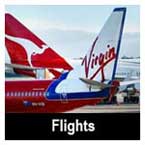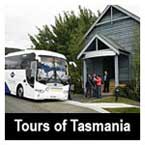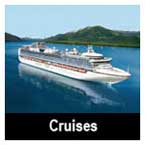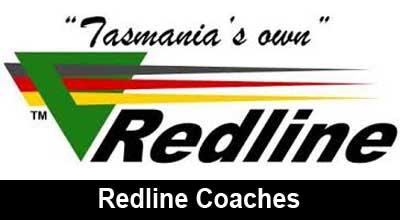Book Travel
Because it is an island, Tasmania is the only state of Australia that cannot be reached by road, unless of course you take the car ferry from Melbourne to the north coastal Tasmanian port of Devonport. This is a popular option for mainlanders as one needs a motor vehicle when touring Tasmania as public transport options are limited.
Coming To Tasmania By Ferry
 Tasmania is linked by sea to the mainland view the car and passenger ferries Spirit of Tasmania I and II, which ply the waters of Bass Strait every night (duration: 10hrs 30 minutes), and during daylight hours in the summer months. Getting on and off with a car is an easy, painless experience; the only delay is likely to be going through the quarantine check at Devonport which is slow in peak periods. Once that is behind you, there's something magic about heading along the coastal road to Devonport to Burnie just after sunrise with the road to yourself, with cows grazing on the lush green grass beside the shoreline.
The Spirit of Tasmania operates daily from Station Pier, Melbourne to Devonport in Tasmania, running overnight, with additional trips in daylight hours during peak travel periods (mainly Summer); duration approx. 12 hours. The drive from Devonport to Hobart is 285 km (allow 4 hours).
More >>
Tasmania is linked by sea to the mainland view the car and passenger ferries Spirit of Tasmania I and II, which ply the waters of Bass Strait every night (duration: 10hrs 30 minutes), and during daylight hours in the summer months. Getting on and off with a car is an easy, painless experience; the only delay is likely to be going through the quarantine check at Devonport which is slow in peak periods. Once that is behind you, there's something magic about heading along the coastal road to Devonport to Burnie just after sunrise with the road to yourself, with cows grazing on the lush green grass beside the shoreline.
The Spirit of Tasmania operates daily from Station Pier, Melbourne to Devonport in Tasmania, running overnight, with additional trips in daylight hours during peak travel periods (mainly Summer); duration approx. 12 hours. The drive from Devonport to Hobart is 285 km (allow 4 hours).
More >>
Coming To Tasmania By Air
 Hobart, Launceston, Burnie and King Island are all gateways for domestic air traffic from the mainland to Tasmania. The majority of flights are from Melbourne and Sydney and go to Launceston or Hobart. The latter is still classified as an International Airport with full customs and immigration facilities, but the airport has not had a regular scheduled international passenger service since the 1990s (from Christchurch, New Zealand). Qantas, Virgin Blue, Jetstar, Tasair, REx and Tiger Airways provided regular services to the mainland.
Hobart, Launceston, Burnie and King Island are all gateways for domestic air traffic from the mainland to Tasmania. The majority of flights are from Melbourne and Sydney and go to Launceston or Hobart. The latter is still classified as an International Airport with full customs and immigration facilities, but the airport has not had a regular scheduled international passenger service since the 1990s (from Christchurch, New Zealand). Qantas, Virgin Blue, Jetstar, Tasair, REx and Tiger Airways provided regular services to the mainland.
Tasair caters also for internal air travel, with daily scheduled flights connecting Hobart, Launceston, Burnie, Devonport, King Island and Flinders Island.
Much of the air traffic into Tasmania is through Hobart International Airport. In addition to domestic and general aviation operations, Hobart Airport, located 17 km from the city on a plain between Frederick Henry Bay and Barilla Bay, provides the only international gateway to the island. Hobart is one of the few cities in Australia to enjoy curfew-free air services. Launceston Airport is also widely used, particularly for travellers from the mainland seeking access to the north of the state.
Flight Times to/from Tasmania
Hobart to/from:
Sydney 1 hour 55 min.
Melbourne 1 hour 15 min.
Brisbane (direct - limited flights per day) 2 hours 35 min.
Brisbane (via Sydney or Melbourne) 4 hours 10 min.
Perth (via Melbourne) 4 hours 15 min.
Adelaide (via Melbourne) 2 hours 35 min.
Darwin (via Melbourne or Sydney) 7 hours 15 min.
Launceston to/from:
Sydney (via Melbourne) 3 hours 5 min.
Melbourne 1 hour 35 min.
Flinders Island (Sharp Airlines) 35 min.
King Island (Sharp Airlines) 1 hour 35 min.
Burnie to/from:
Melbourne (Regional Express) 1 hour 15 min.
King Island to/from:
Sydney (via Melbourne) 3 hours 5 min.
Launceston (Sharp Airlines) 1 hour 35 min.
Wynyard (Sharp Airlines) 45 minutes
Melbourne (Regional Express) 55 minutes
Flinders Island to/from:
Melbourne (Sharp Airlines) 1 hour 5 min.
Launceston (Sharp Airlines) 35 minutes
Coming To Tasmania By Cruise Ship
 An increasing number of cruise ship operators are including Tasmania on their schedules cruises. Most visits are for a 24-hour period. Being a deep-water port, Hobart can handle cruise ships of any size. Vessels berth near the city centre in the heart of the historic Salamanca area within walking distance of the city centre and historic Battery Point. Burnie, on Bass Strait in Tasmania's North West, is also a port of call for cruise ships. Burnie's port services Tasmania's major West Coast mines and handles most types of bulk shipping including, minerals, fuels, woodchips and logs, as well as containerised consumables. The export of forest products is an important operation of the port.
An increasing number of cruise ship operators are including Tasmania on their schedules cruises. Most visits are for a 24-hour period. Being a deep-water port, Hobart can handle cruise ships of any size. Vessels berth near the city centre in the heart of the historic Salamanca area within walking distance of the city centre and historic Battery Point. Burnie, on Bass Strait in Tasmania's North West, is also a port of call for cruise ships. Burnie's port services Tasmania's major West Coast mines and handles most types of bulk shipping including, minerals, fuels, woodchips and logs, as well as containerised consumables. The export of forest products is an important operation of the port.











